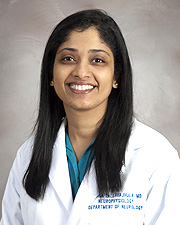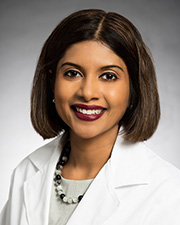Sleep Disorders
What is a sleep disorder?
An estimated 50 to 70 million adults in the U.S. suffer from sleep disorders, which can increase the risk of accidents, lower immunity, and lead to serious health and quality-of-life issues. Specific disorders include sleep apnea, narcolepsy, insomnia, periodic limb disorders, sleep walking and talking, REM behavior disorders, and hypersomnolence.
Our UTHealth Neurosciences specialists offer a comprehensive program to help treat a full spectrum of sleep disorders in both adults and children. We also have extensive experience treating sleep disorders in patients with neurological conditions. Our medical team will take the time to listen to your concerns and evaluate personalized treatment options.
Treatment might include medication, behavioral therapy, sleep routine changes, and lifestyle modifications.
Early Signs of a Sleep Disorder
Difficulties falling asleep or feeling exhausted in the morning are typical symptoms of sleep disorders. Trouble sleeping impacts quality of life. It Is important to resolve the underlying causes.
Insomnia is a condition that makes it difficult to fall asleep at night. People with insomnia also may wake up during the night and may be unable to return to sleep easily. The causes can range from stress to illness. Lifestyle changes, sleep routines, and medications can reduce symptoms.
Restless Legs Syndrome is a condition that makes people feel an overwhelming, uncomfortable urge to move their legs. The cause is thought to be a shortage of dopamine in the brain. The symptoms worsen at night, making sleep difficult. Lifestyle changes, medications or other treatment of an underlying cause can often resolve the symptoms.
Sleep apnea is a potentially serious disorder that causes a person’s breathing to repeatedly stop and start during sleep. There are three types – obstructive sleep apnea, central sleep apnea, or complex sleep apnea – and they can often be successfully treated with a continuous positive airway pressure (CPAP) machine or oral appliance. Other options, for some candidates only, can include surgery or implantable devices.
Diagnosis
You should see a doctor if sleep difficulties are disrupting your well-being. Your physician will work to determine the underlying cause of your trouble sleeping by conducting a medical history and physical examination. You might be asked to keep a sleep journal and undergo a sleep study.
Treatment
Sleep disorders can be treated through a variety of combinations of lifestyle changes, medications, and improvements to sleep routines and sleep hygiene. In some cases, technology like a CPAP machine or a minimally invasive procedure may help resolve the symptoms. Your care team will work to find the right fit to ensure that you are well-rested and enjoying a high quality of life.
Sleep Specialists
 |
Sudha S. Tallavajhula, MD | Neurologist Fellowships: Sleep Medicine and Clinical Neurophysiology |
|
 |
Aparajitha Verma, MD | Neurologist Fellowships: Clinical Neurophysiology and Sleep Medicine |
Sleep Disorders
Contact Us
At UTHealth Neurosciences, we offer patients access to specialized neurological care at clinics across the greater Houston area. To ask us a question, schedule an appointment, or learn more about us, please click below to send us a message. In the event of an emergency, call 911 or go to the nearest Emergency Room.











